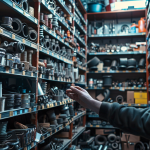The leisure industry in the UK is a vibrant market that offers countless opportunities for entrepreneurs. Among these opportunities, the board game cafes have recently gained significant traction. These establishments offer a unique blend of social interaction, fun, and relaxation that appeals to a broad demographic. This article will guide you on how to develop such a business in the UK’s leisure industry, focusing on games, community, local development, and, of course, great coffee.
1. Understanding the Market and Community
The first step in developing a successful board game cafe is understanding the market and the community you aim to serve. This involves identifying the demographic that frequents these establishments, their interests, and how your cafe can cater to these needs.
A lire également : How Can Mindfulness-Based Stress Reduction Benefit UK Healthcare Workers?
Board game cafes attract a diverse crowd, from friends looking for a fun night out, families seeking a wholesome leisure activity, to game enthusiasts eager to try out new titles. Ensuring your cafe appeals to all these groups is key. One way to achieve this is to offer a wide range of games, from traditional classics like chess and monopoly to modern tabletop games like Settlers of Catan and Ticket to Ride.
Understanding your local community is equally important. Are there any existing gaming groups in your area? Could you partner with local schools or organizations to host events? What aspects of the local culture could be incorporated into your cafe? The answers to these questions can help you create a cafe that is both a business and an essential part of the community.
A découvrir également : Unlock love: explore free swedish dating sites in english
2. Building a Team and Forming Alliances
The next step is building a team that shares your passion for games and coffee. Your team will be the face of your business, and their enthusiasm can help create a warm, inviting atmosphere that attracts customers. Staff should be knowledgeable about the various games available and willing to teach newcomers how to play. They should also be able to make a great cup of coffee – an essential component of any successful cafe.
Forming alliances with game developers, distributors, and local businesses can also be beneficial. These alliances can help you keep your game library updated with the latest titles, provide promotional materials, and even host game launch events. Partnering with local businesses can help create cross-promotion opportunities, driving traffic to your cafe and supporting the local economy.
3. Choosing the Right Location and Design
The location of your cafe can significantly impact its success. Ideally, your cafe should be in a busy part of the city, easily accessible, and have ample parking. Proximity to colleges, offices, and residential areas can provide a steady stream of customers.
The design of your cafe should reflect its dual nature as a place for games and coffee. Tables should be big enough for board games and comfortable seating, lighting should be sufficient but not overly bright, and soundproofing can help manage the noise levels. Also, consider a dedicated area for displaying the games and an efficient layout for the coffee shop section.
4. Creating a Business Plan and Securing Finance
Like any business venture, a clear and comprehensive business plan is key to developing a board game cafe. Your plan should outline your market research, business model, marketing strategy, and financial projections. It will not only guide your decision-making but also be essential when seeking financing.
When it comes to financing, options can include personal savings, business loans, or even crowdfunding. Each has its pros and cons, and you may end up using a combination of these. A detailed business plan can help convince potential investors or lenders that your board game cafe is a viable business.
5. Marketing Your Board Game Cafe
Once you’ve established your board game cafe, the next step is to get the word out. Social media can be a powerful tool for promoting your cafe, highlighting new games, and announcing events. Consider partnering with local bloggers or influencers to reach a wider audience.
Hosting regular events can also be a great way to attract customers. This could include game tournaments, theme nights, or workshops where people can learn new games. Offering special discounts or promotions can also incentivize people to visit.
Remember, the goal is to create a space where people can enjoy good coffee, great games, and a sense of community. With careful planning, a dedicated team, and a passion for what you do, your board game cafe can become a cherished part of your city’s leisure scene.
6. Ensuring a Quality Food and Drink Offering
Whether it’s a simple cup of coffee or a full meal, the quality of the food and drink offering at your board game cafe is a crucial aspect of its success. Most customers will expect to be able to purchase refreshments while they spend time playing games. Therefore, providing good quality food and drinks can not only enhance the overall customer experience but also increase your profit margins.
Firstly, a well-trained barista is a must for any coffee shop. High-quality coffee is a cornerstone of most cafes, and for a board game cafe, it’s no different. Your coffee should be good enough to compete with other cafes in the area, as it could be a deciding factor for potential customers.
Additionally, you should consider offering a variety of food options to cater to different dietary needs and preferences. This includes providing vegetarian, vegan, and gluten-free options, as well as healthier snack alternatives.
Importantly, remember that your food and drink offerings should reflect your business’s ethos and complement the overall feeling of your cafe. For instance, you could offer game-themed dishes or drinks, bringing an element of fun to your menu.
7. Building a Strong Leisure Framework
Building a strong leisure framework involves creating a welcoming environment that encourages customers to return. This goes beyond just having comfortable furniture and a good selection of board games.
A crucial aspect of this framework is customer service. Your staff should be friendly, helpful, and knowledgeable about the games you offer. Offering a game matching service, where staff help customers choose games based on their preferences, could be a unique selling point that sets your cafe apart from others.
Regular events and tournaments can also contribute to a strong leisure framework. These can create a sense of community and give customers a reason to return. Consider offering different events for various demographics, such as family game nights, student discounts, or even senior game mornings.
Lastly, remember that feedback is essential for continuous improvement. Listen to your customers’ suggestions and concerns, and act on them. This can help you adapt your business to better meet the needs of your customers and the community.
Conclusion
Developing a board game cafe in the UK’s leisure industry is a unique business opportunity that combines the joy of board games with the comfort of coffee culture. While the journey may seem daunting, understanding your market and community, building a supportive team and alliances, choosing the right location, crafting a comprehensive business plan, marketing effectively, ensuring a quality food and drink offering, and building a strong leisure framework can lead to a successful and thriving business venture.
As you embark on this journey, keep the essence of your board game cafe at the forefront: providing a venue for people to relax, socialise, and enjoy the world of tabletop gaming while sipping a delicious cup of coffee. With dedication, hard work, and a genuine passion for board games, your board game cafe can become a cherished part of your city’s leisure scene.











